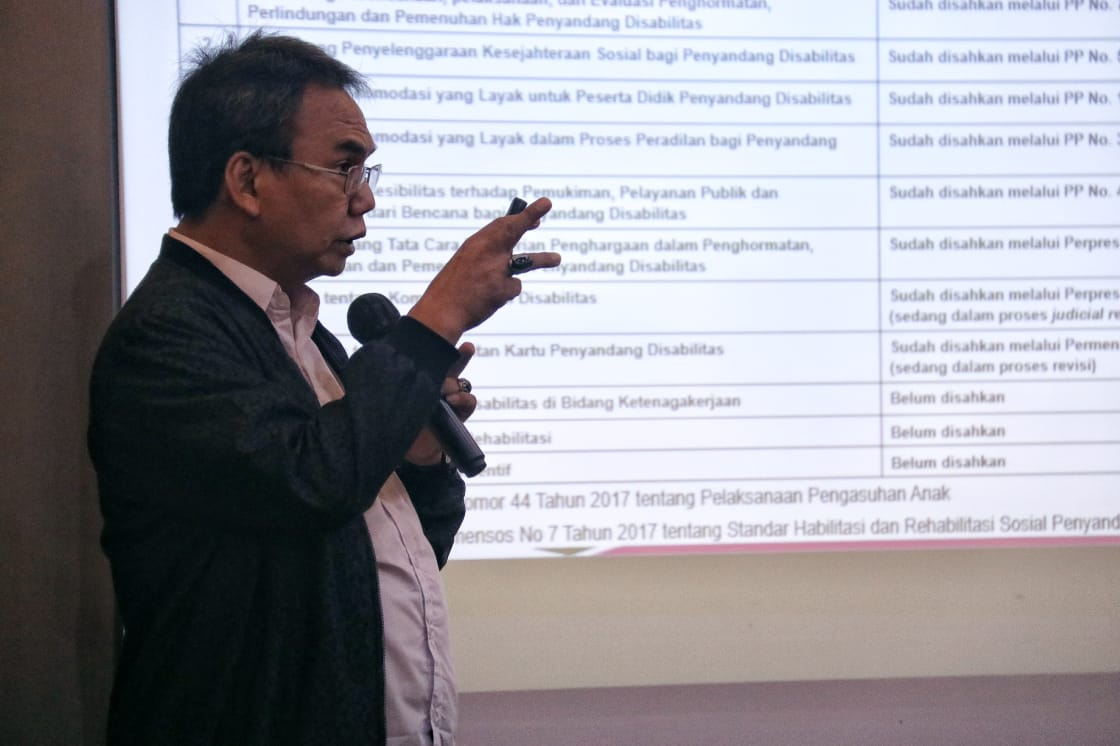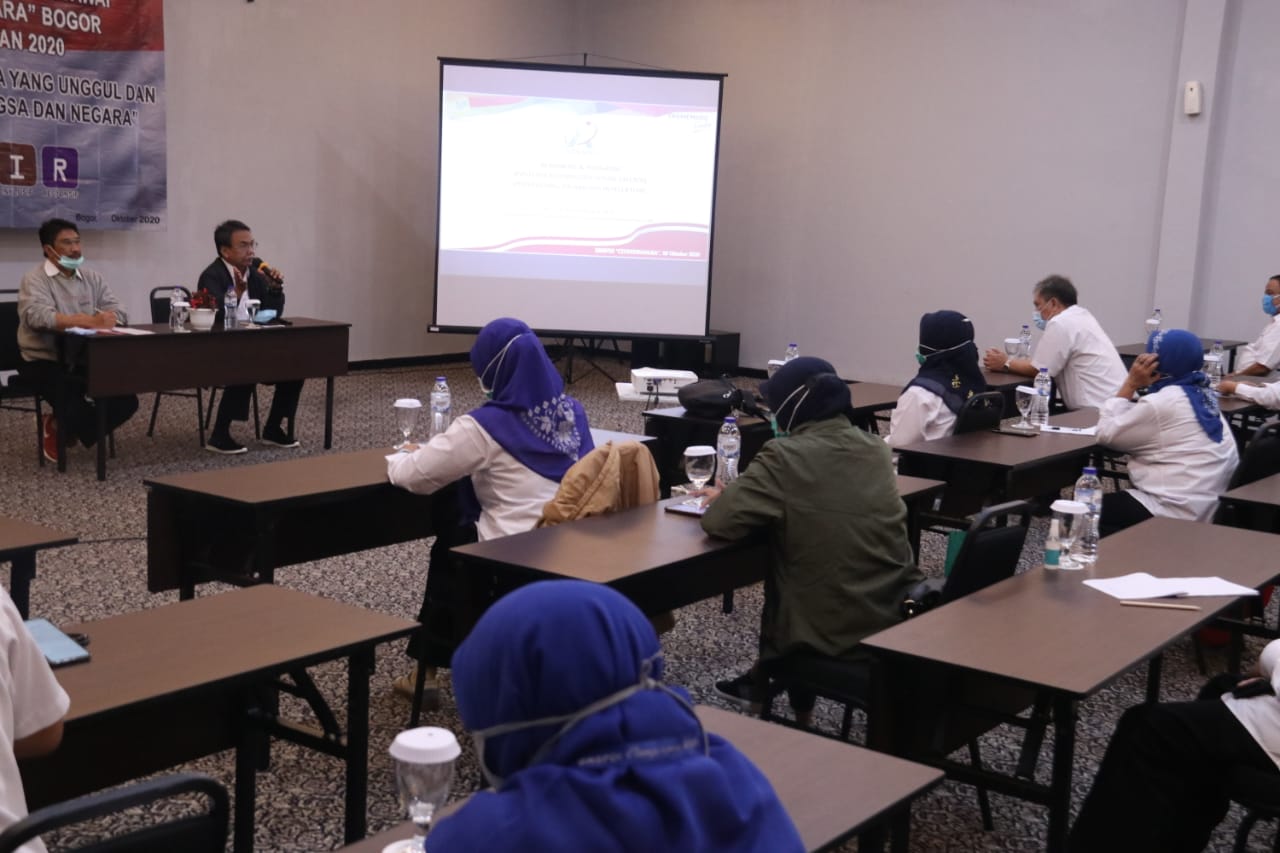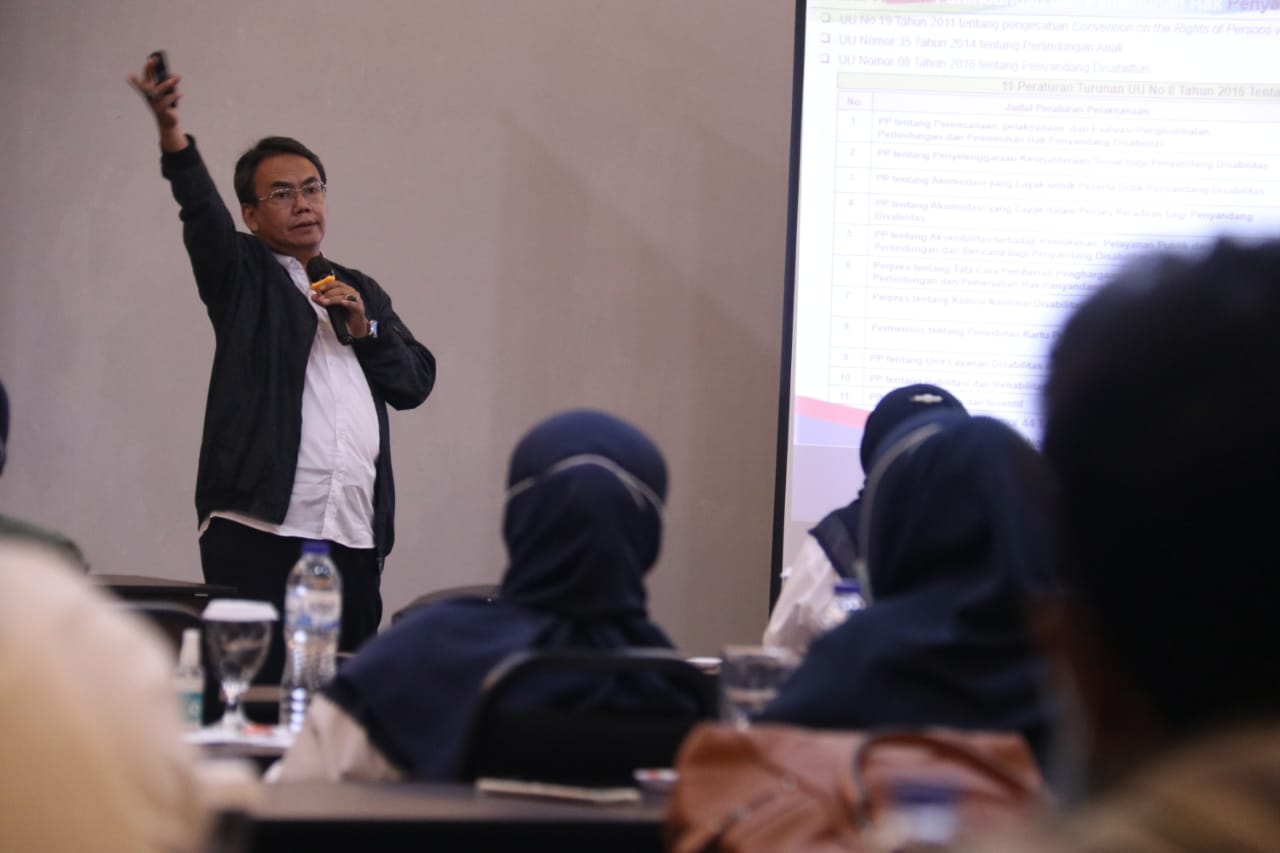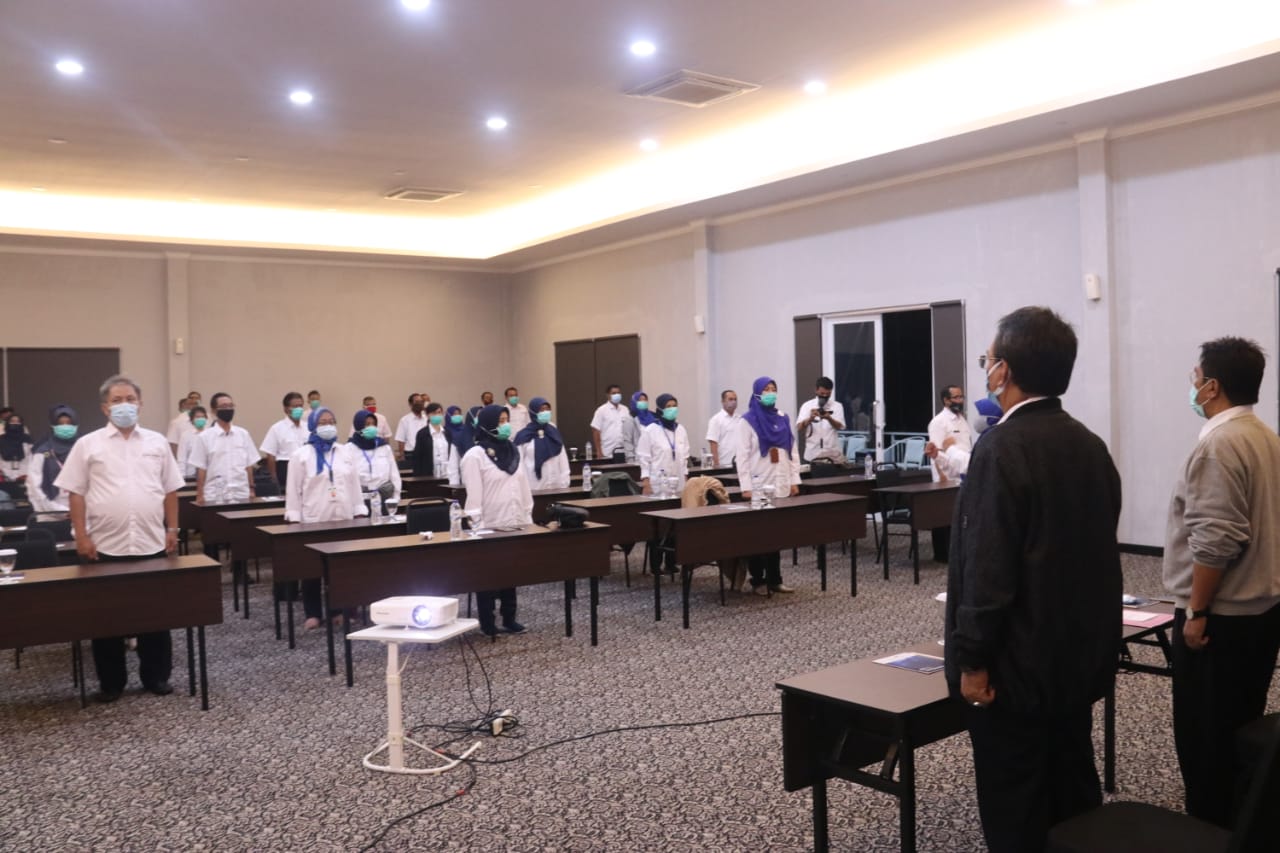Writer :
Humas Ditjen Rehsos
Editor :
Intan Qonita N
Translator :
Intan Qonita N
BOGOR (October 26, 2020) - Director General of Social Rehabilitation of the Indonesian Ministry of Social Affairs Harry Hikmat was a speaker at the "Ciungwanara" Social Rehabilitation Center for Persons with Intellectual Disabilities (BRSPDI) Employee Capacity Building activity at Leuweung Geledegan Ecolodge, Bogor, West Java.
Harry explained that the legal basis for the Protection and Fulfillment of the Rights of Persons with Disabilities in Indonesia, among others, is contained in Law No. 19 of 2011 concerning the ratification of the Convention on the Rights of Persons with Disabilities, Law No. 35 of 2014 concerning Child Protection, Law No. 08 of 2016 concerning Persons with Disabilities.
“There is a change in the paradigm of the Law on Persons with Disabilities in Indonesia. The paradigm shift from Law No. 4/1997 concerning Persons with Disabilities to Law No. 8/2016 concerning Persons with Disabilities, for example, from object to subject, charity base to human right base, special treatment to inclusion. Currently, not only the Ministry in the social sector is involved, the Ministry in the fields of education, health, infrastructure, transportation, labor, justice, and others are also involved," said Harry at the location, Wednesday (28/10/2020).
Harry explained more specifically about People with Intellectual Disabilities (PDI). PDI is a disturbance in the function of thought due to a below average level of intelligence, including slow learning, mental disabilities and down syndrome. “From this, we can see that the characteristics of intellectual disabilities have a significant disability. Intellectual barriers also have limitations in intellectual functioning and behavioral adaptation, both of which relate to social and practical skills in everyday life,” added Harry.
The Indonesian Ministry of Social Affairs has ways of dealing with Persons with Intellectual Disabilities (PDI), including Family and community based ATENSI, Residential based ATENSI and Outreach Services. Family-based ATENSI is carried out with day care/home care services with Sheltered Workshops for Care and Compassion, Rumah Cinta for Intellectual Disabilities, Rumah Kinasih such as in Blitar, West Bandung and Ponorogo.
Residential-based ATENSI through Center/BRSPDI and collaboration/referral with regional institutions/Social Welfare Agencies (LKS). Furthermore, Harry explained about the Technical Policy for Social Rehabilitation Assistance (ATENSI).
Harry explained that the legal basis for the Protection and Fulfillment of the Rights of Persons with Disabilities in Indonesia, among others, is contained in Law No. 19 of 2011 concerning the ratification of the Convention on the Rights of Persons with Disabilities, Law No. 35 of 2014 concerning Child Protection, Law No. 08 of 2016 concerning Persons with Disabilities.
“There is a change in the paradigm of the Law on Persons with Disabilities in Indonesia. The paradigm shift from Law No. 4/1997 concerning Persons with Disabilities to Law No. 8/2016 concerning Persons with Disabilities, for example, from object to subject, charity base to human right base, special treatment to inclusion. Currently, not only the Ministry in the social sector is involved, the Ministry in the fields of education, health, infrastructure, transportation, labor, justice, and others are also involved," said Harry at the location, Wednesday (28/10/2020).
Harry explained more specifically about People with Intellectual Disabilities (PDI). PDI is a disturbance in the function of thought due to a below average level of intelligence, including slow learning, mental disabilities and down syndrome. “From this, we can see that the characteristics of intellectual disabilities have a significant disability. Intellectual barriers also have limitations in intellectual functioning and behavioral adaptation, both of which relate to social and practical skills in everyday life,” added Harry.
The Indonesian Ministry of Social Affairs has ways of dealing with Persons with Intellectual Disabilities (PDI), including Family and community based ATENSI, Residential based ATENSI and Outreach Services. Family-based ATENSI is carried out with day care/home care services with Sheltered Workshops for Care and Compassion, Rumah Cinta for Intellectual Disabilities, Rumah Kinasih such as in Blitar, West Bandung and Ponorogo.
Residential-based ATENSI through Center/BRSPDI and collaboration/referral with regional institutions/Social Welfare Agencies (LKS). Furthermore, Harry explained about the Technical Policy for Social Rehabilitation Assistance (ATENSI).
Technical policies, namely respect, protection and fulfillment of the rights of persons with disabilities; Strengthening the integrated social rehabilitation system with social security, social empowerment & social protection of beneficiaries; Expanding the reach of social rehabilitation of beneficiaries based on family, community and residential basis; Strengthening the capacity and institutions of the Social Rehabilitation Center and LKS; Enhancement of prevention, education and sensitization campaigns across sectors and communities; Increasing the role of the community and the private sector in social rehabilitation services.
In the ATENSI Program, there are Centrelink-Based Services such as Family-Based, Community-Based and Residential ATENSI.
“The family is the smallest unit in society and is the first and main socialization institution in society that has an important role in realizing the welfare of its members. Family the best place for beneficiaries. So, family support must be strengthened, in order to realize the fulfillment of the rights and needs of beneficiaries," he explained.
Community-based attention, Harry continued, can mean that every community has the potential to overcome existing social welfare problems independently by organizing themselves to manage their human, natural and social resources. The community is closest to the beneficiary's family. Therefore, the community must be strengthened through LKS to be more sensitive and responsive in preventing and solving problems experienced by beneficiaries.
He added that institutional/residential-based services are the last alternative after family and community-based services. "Residential services are the last alternative. Therefore, the Central Technical Implementation Unit (UPT)/Center as centrelink/SERASI must focus its services on increasing the capacity of Regional UPTs and LKS so that they can focus their activities more on strengthening family support so that abandoned/vulnerable/special needs beneficiaries can return to their homes as soon as possible. family," Harry added.
Regarding Human Resources (HR) or employees at "Ciungwanara" Center in Bogor, Harry encourages them to be active in serving Persons with Intellectual Disabilities (PDI). "Keep the spirit, the world continues to change. People who can adapt to change will be blessed but those who cannot adapt will be left behind. Believe in yourself," concluded Harry as he opened the activity.
On that occasion Harry was accompanied by the Head of "Ciungwanara" Center, Esa Sumantri and all his employees.
In the ATENSI Program, there are Centrelink-Based Services such as Family-Based, Community-Based and Residential ATENSI.
“The family is the smallest unit in society and is the first and main socialization institution in society that has an important role in realizing the welfare of its members. Family the best place for beneficiaries. So, family support must be strengthened, in order to realize the fulfillment of the rights and needs of beneficiaries," he explained.
Community-based attention, Harry continued, can mean that every community has the potential to overcome existing social welfare problems independently by organizing themselves to manage their human, natural and social resources. The community is closest to the beneficiary's family. Therefore, the community must be strengthened through LKS to be more sensitive and responsive in preventing and solving problems experienced by beneficiaries.
He added that institutional/residential-based services are the last alternative after family and community-based services. "Residential services are the last alternative. Therefore, the Central Technical Implementation Unit (UPT)/Center as centrelink/SERASI must focus its services on increasing the capacity of Regional UPTs and LKS so that they can focus their activities more on strengthening family support so that abandoned/vulnerable/special needs beneficiaries can return to their homes as soon as possible. family," Harry added.
Regarding Human Resources (HR) or employees at "Ciungwanara" Center in Bogor, Harry encourages them to be active in serving Persons with Intellectual Disabilities (PDI). "Keep the spirit, the world continues to change. People who can adapt to change will be blessed but those who cannot adapt will be left behind. Believe in yourself," concluded Harry as he opened the activity.
On that occasion Harry was accompanied by the Head of "Ciungwanara" Center, Esa Sumantri and all his employees.
Share :
 English
English
 Bahasa
Bahasa




